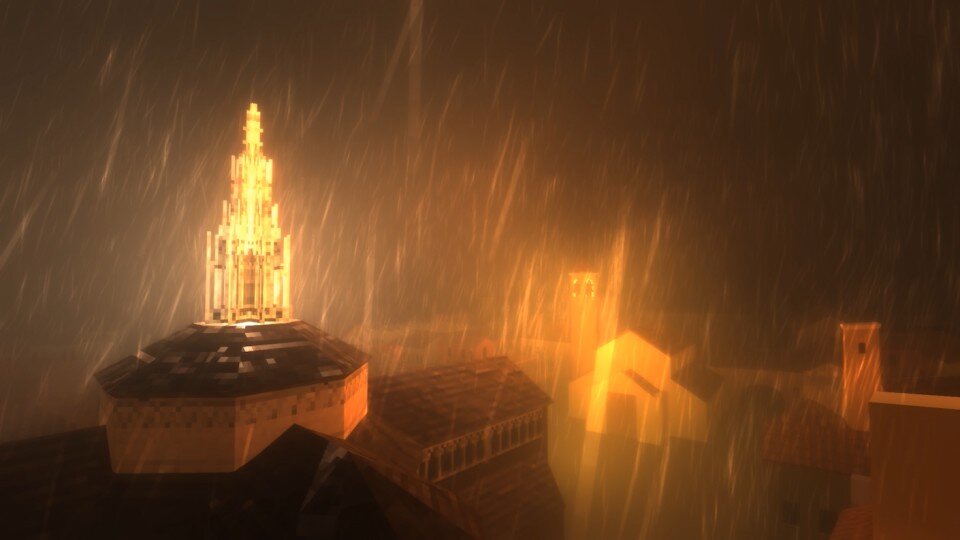Julián Palacios
/Julián Palacios is nominated for the A MAZE: Awards 2020. His audiovisual narrative Promesa explores the individual relationship with space by moving through memories, dreams and fantasies. Enjoy the interview with him.
Julián Palacios
A MAZE.: How would you describe yourself?
Julián Palacios: My name is Julián Palacios and I’m from Milan. I was born here but my family is from Argentina and Uruguay. My work is in part about this, about who I am and my identity, and is also about my love for 3D places.
A MAZE.: Are you a wild heart? If yes, what makes you think you’re a wild heart?
Julián Palacios: Honestly I think I still don’t know my heart that well.
A MAZE.: Why did you start making games or playful media works?
Julián Palacios: I started experimenting with 3D and Unity without a real focus. I was not interested in game mechanics or in systems but in the audio-visual image. With time I have realized that what I truly love is the way in which virtual spaces can evoke in us a feeling of reality, creating a link between our presence in the world with that in the videogame.
A MAZE.: Who (or what) is your biggest inspiration? Think beyond games too - musicians, writers, filmmakers, artists, scientists, …
Julián Palacios: In videogames I usually like short narrative games, both old and new, especially indie games and freeware stuff. Above all, the 3D narrative games by Increpare have been a huge influence. They taught me a lot. Outside of videogames there are many things that inspire me, but mainly cinema and music, both of very different kinds.
A MAZE.: Where can we find this in your work?
Julián Palacios: I think the russian director Andrej Tarkovskij was a big influence in defining the way I consider time inside videogames, and this is particularly true for Promesa.
SCREENSHOT OF PROMESA
A MAZE.: What message(s) are you sending out with your works?
Julián Palacios: I’m not sure. Maybe to feel present.
A MAZE.: Is there a repeating pattern in all of your works the players may experience?
Julián Palacios: I don’t have that many works, and Promesa is by far the biggest thing I ever did. It has some similarities, in the themes (both conceptually and visually) with my previous work, Cartas, from 2016.
A MAZE.: What influences your work more: Past (history), present (contemporary) or future (scifi) and what are your sources?
Julián Palacios: The past. I like to use spaces in videogames as a way to connect our memories and our experiences of reality with what we see on the screen. And I love old music, movies, pictures, books. They give us glimpses of what were different ways of life.
A MAZE.: What does responsibility towards your players mean to you as an artist?
Julián Palacios: I feel like I’m my first player, so I just try to be honest about my work. Also, I think that the time after the release of Promesa will make a lot of things about responsibility clearer to me.
A MAZE.: What impact is the current pandemic having on you and your work?
Julián Palacios: It’s having a big impact on me, but not as dramatic as to other people, so I’m lucky. On my work not much I must say, I kept my workflow from before the pandemic.
A MAZE.: If there is something wrong in the field of games / playful media, what would you fix first?
Julián Palacios: I think that the industry is too focused on the playful aspect of interaction. I think that there are many possibilities with non-playful interaction that are less explored.
SCREENSHOT OF PROMESA
A MAZE.: What are the three games someone who never played a game before should play? Why those?
Julián Palacios: Myst, LSD: Dream Emulator & MirrorMoon EP. If I had a fourth slot I would add Bedrooms by Increpare. These are the works that more than everything else showed me what videogames can also be about. Windows that can connect you with distant worlds and times, and in which you’re completely alone: just you and the image.
A MAZE.: How do you relax and find balance?
Julián Palacios: I used to see my friends quite often, but that is suspended right now :( But yeah, I love to spend time with friends.
A MAZE.: What are the main challenges for artists in your country to sustain themselves?
Julián Palacios: Probably to find a stable and reliable source of income. I feel that the field of culture is a little stale here.
A MAZE.: How do you see interactive arts in 10 years from now? In 2030! Tell us your vision.
Julián Palacios: Maybe in 2030 the interactive arts industry will be like a giant show business. I think that this ten years will be crucial for narrative games and for the diversification of what interactivity means. For me, technology and the videogames industry are evolving too fast. This fast evolution is not really useful, but it comes at huge expenses. This ten years will increase the possibilities of what we can do, but also its inequalities. This virus, in some way, could be a blessing!


